Should Assisted Dying Be Legalized in the UK: A Comprehensive Analysis
VerifiedAdded on 2024/05/30
|11
|2731
|175
Essay
AI Summary
This essay examines the complex issue of legalizing assisted dying in the United Kingdom, exploring the ethical, legal, and societal considerations involved. It delves into the perspectives of various stakeholders, including patients, healthcare professionals, religious groups, and the government. The essay discusses the arguments for and against assisted dying, highlighting issues such as patient autonomy, the right to die with dignity, the potential for misuse, and the impact on vulnerable populations. It also addresses the role of medical ethics, the potential conflicts for healthcare providers, and the need for safeguards to ensure that assisted dying is only available to competent individuals who are making informed decisions. The essay concludes by emphasizing the importance of person-centeredness in healthcare and the need for society to engage in a thoughtful and compassionate dialogue about this sensitive issue, with the aim of finding a balance between individual rights and the protection of vulnerable individuals.
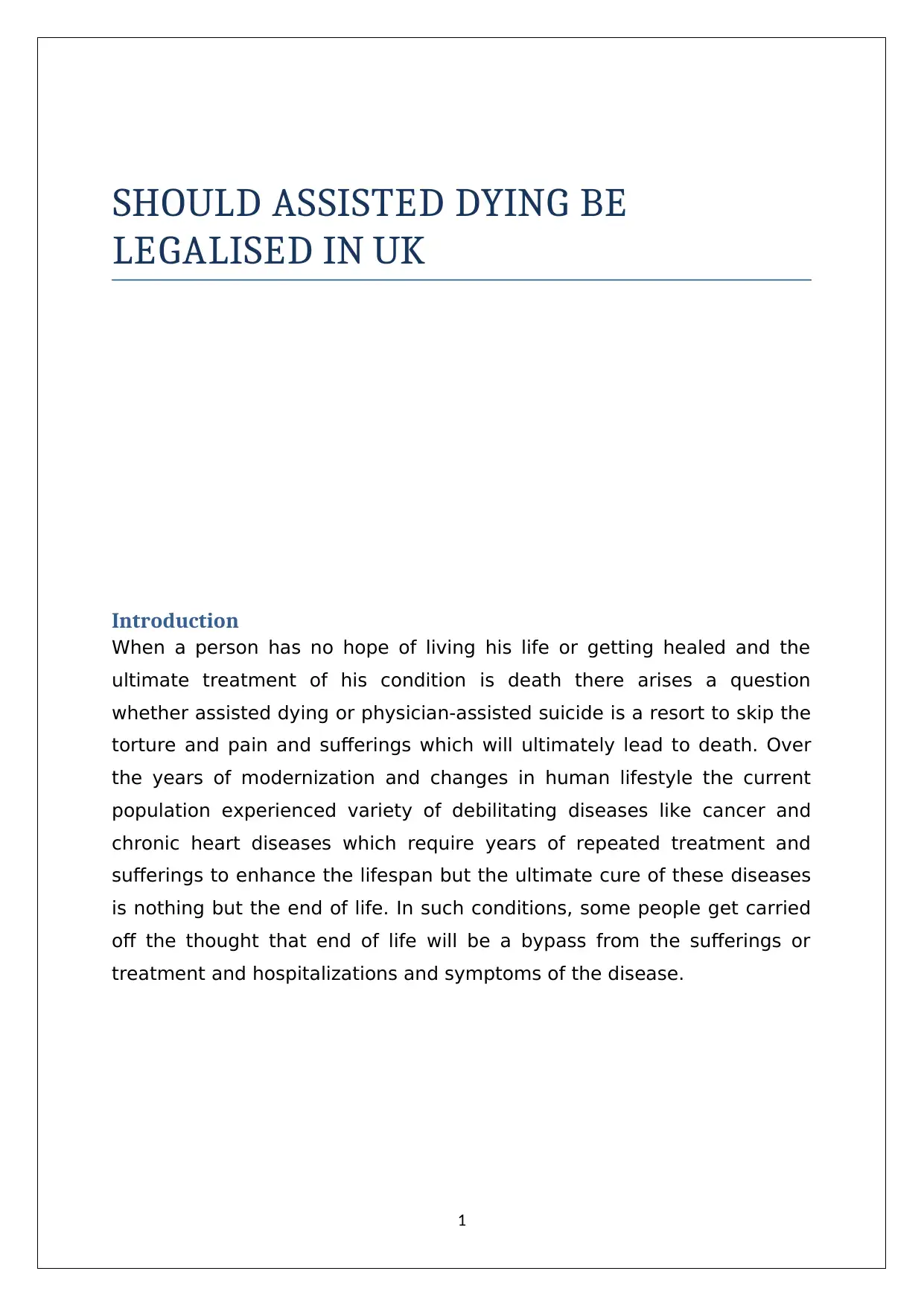
SHOULD ASSISTED DYING BE
LEGALISED IN UK
Introduction
When a person has no hope of living his life or getting healed and the
ultimate treatment of his condition is death there arises a question
whether assisted dying or physician-assisted suicide is a resort to skip the
torture and pain and sufferings which will ultimately lead to death. Over
the years of modernization and changes in human lifestyle the current
population experienced variety of debilitating diseases like cancer and
chronic heart diseases which require years of repeated treatment and
sufferings to enhance the lifespan but the ultimate cure of these diseases
is nothing but the end of life. In such conditions, some people get carried
off the thought that end of life will be a bypass from the sufferings or
treatment and hospitalizations and symptoms of the disease.
1
LEGALISED IN UK
Introduction
When a person has no hope of living his life or getting healed and the
ultimate treatment of his condition is death there arises a question
whether assisted dying or physician-assisted suicide is a resort to skip the
torture and pain and sufferings which will ultimately lead to death. Over
the years of modernization and changes in human lifestyle the current
population experienced variety of debilitating diseases like cancer and
chronic heart diseases which require years of repeated treatment and
sufferings to enhance the lifespan but the ultimate cure of these diseases
is nothing but the end of life. In such conditions, some people get carried
off the thought that end of life will be a bypass from the sufferings or
treatment and hospitalizations and symptoms of the disease.
1
Paraphrase This Document
Need a fresh take? Get an instant paraphrase of this document with our AI Paraphraser
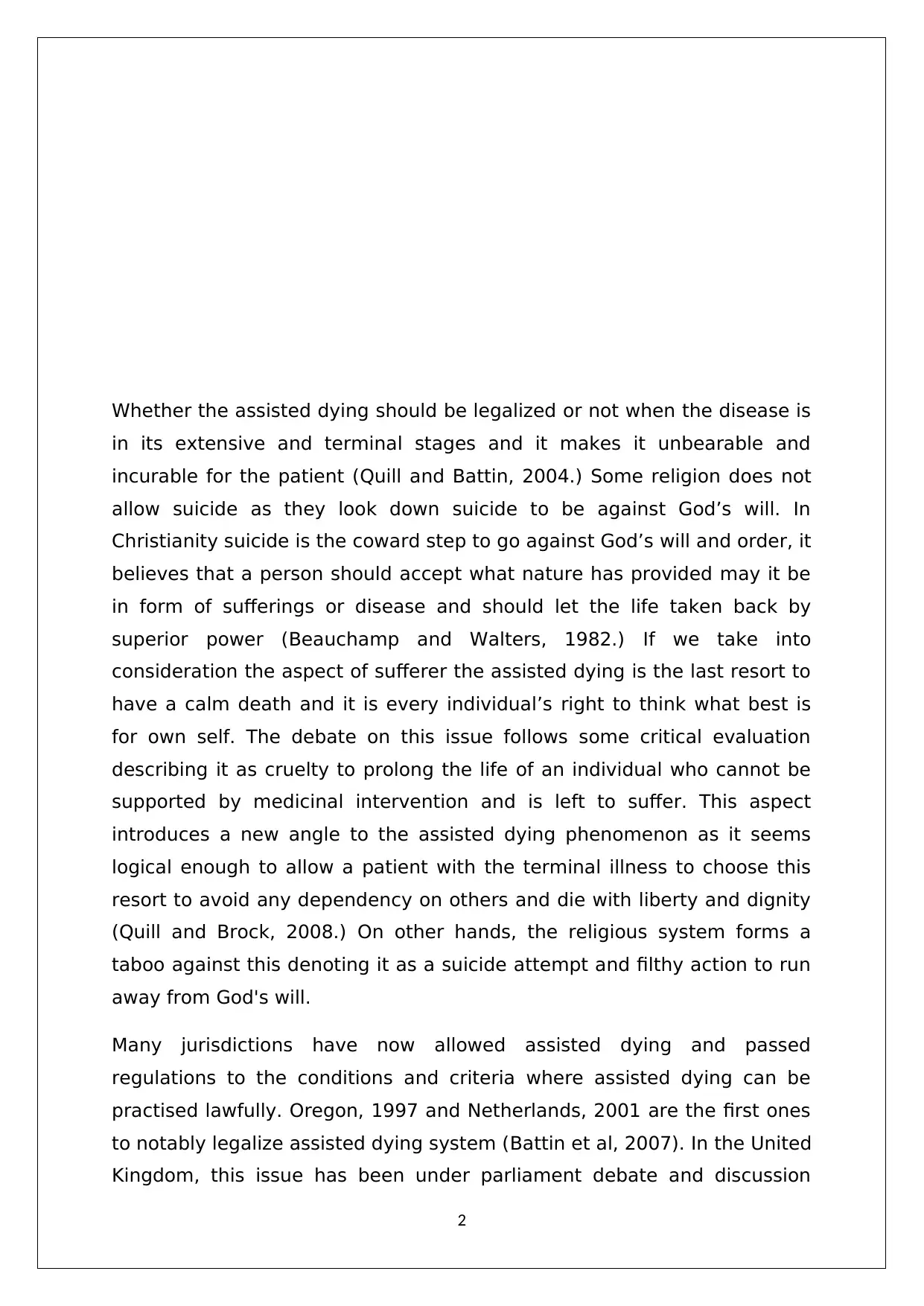
Whether the assisted dying should be legalized or not when the disease is
in its extensive and terminal stages and it makes it unbearable and
incurable for the patient (Quill and Battin, 2004.) Some religion does not
allow suicide as they look down suicide to be against God’s will. In
Christianity suicide is the coward step to go against God’s will and order, it
believes that a person should accept what nature has provided may it be
in form of sufferings or disease and should let the life taken back by
superior power (Beauchamp and Walters, 1982.) If we take into
consideration the aspect of sufferer the assisted dying is the last resort to
have a calm death and it is every individual’s right to think what best is
for own self. The debate on this issue follows some critical evaluation
describing it as cruelty to prolong the life of an individual who cannot be
supported by medicinal intervention and is left to suffer. This aspect
introduces a new angle to the assisted dying phenomenon as it seems
logical enough to allow a patient with the terminal illness to choose this
resort to avoid any dependency on others and die with liberty and dignity
(Quill and Brock, 2008.) On other hands, the religious system forms a
taboo against this denoting it as a suicide attempt and filthy action to run
away from God's will.
Many jurisdictions have now allowed assisted dying and passed
regulations to the conditions and criteria where assisted dying can be
practised lawfully. Oregon, 1997 and Netherlands, 2001 are the first ones
to notably legalize assisted dying system (Battin et al, 2007). In the United
Kingdom, this issue has been under parliament debate and discussion
2
in its extensive and terminal stages and it makes it unbearable and
incurable for the patient (Quill and Battin, 2004.) Some religion does not
allow suicide as they look down suicide to be against God’s will. In
Christianity suicide is the coward step to go against God’s will and order, it
believes that a person should accept what nature has provided may it be
in form of sufferings or disease and should let the life taken back by
superior power (Beauchamp and Walters, 1982.) If we take into
consideration the aspect of sufferer the assisted dying is the last resort to
have a calm death and it is every individual’s right to think what best is
for own self. The debate on this issue follows some critical evaluation
describing it as cruelty to prolong the life of an individual who cannot be
supported by medicinal intervention and is left to suffer. This aspect
introduces a new angle to the assisted dying phenomenon as it seems
logical enough to allow a patient with the terminal illness to choose this
resort to avoid any dependency on others and die with liberty and dignity
(Quill and Brock, 2008.) On other hands, the religious system forms a
taboo against this denoting it as a suicide attempt and filthy action to run
away from God's will.
Many jurisdictions have now allowed assisted dying and passed
regulations to the conditions and criteria where assisted dying can be
practised lawfully. Oregon, 1997 and Netherlands, 2001 are the first ones
to notably legalize assisted dying system (Battin et al, 2007). In the United
Kingdom, this issue has been under parliament debate and discussion
2
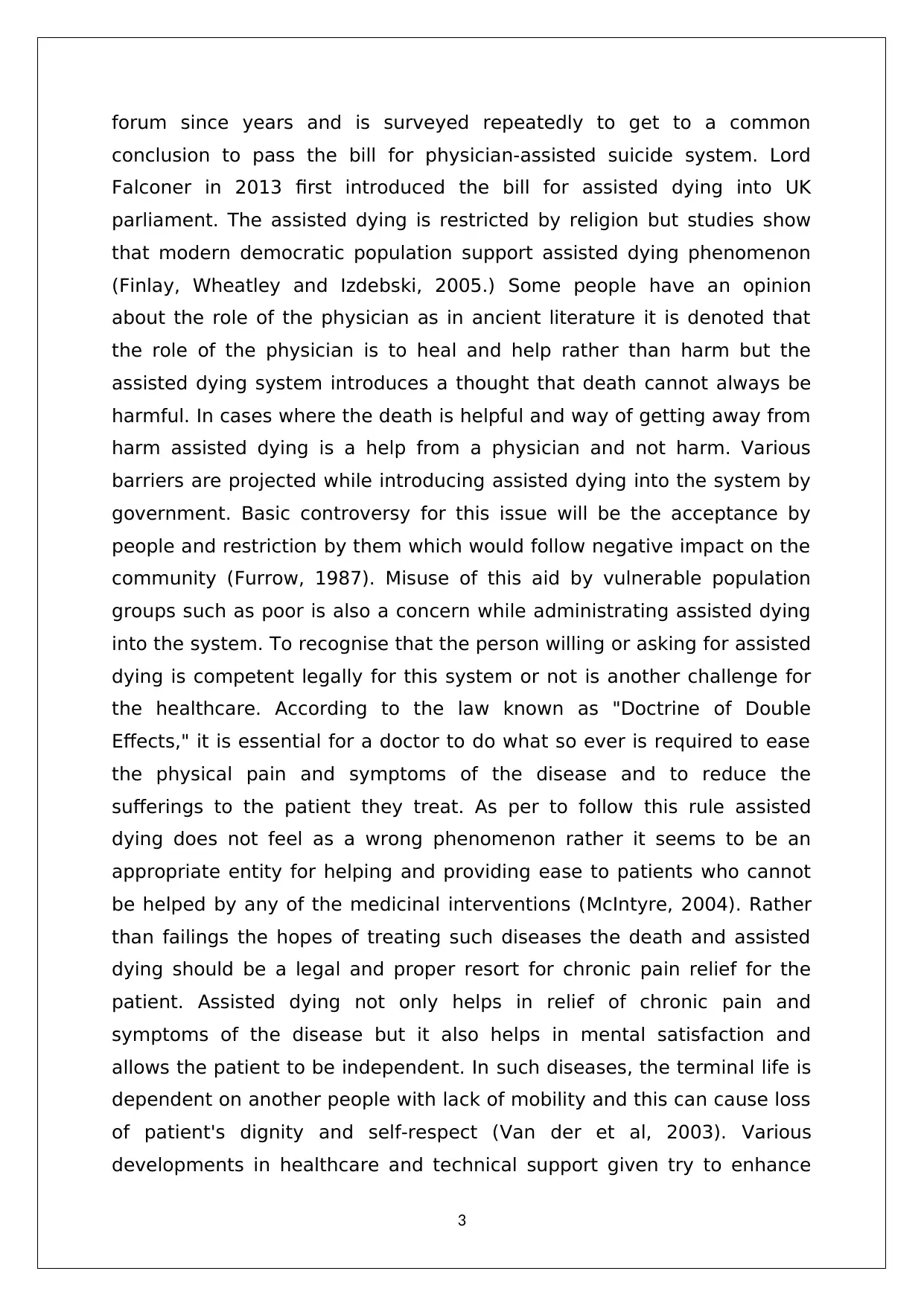
forum since years and is surveyed repeatedly to get to a common
conclusion to pass the bill for physician-assisted suicide system. Lord
Falconer in 2013 first introduced the bill for assisted dying into UK
parliament. The assisted dying is restricted by religion but studies show
that modern democratic population support assisted dying phenomenon
(Finlay, Wheatley and Izdebski, 2005.) Some people have an opinion
about the role of the physician as in ancient literature it is denoted that
the role of the physician is to heal and help rather than harm but the
assisted dying system introduces a thought that death cannot always be
harmful. In cases where the death is helpful and way of getting away from
harm assisted dying is a help from a physician and not harm. Various
barriers are projected while introducing assisted dying into the system by
government. Basic controversy for this issue will be the acceptance by
people and restriction by them which would follow negative impact on the
community (Furrow, 1987). Misuse of this aid by vulnerable population
groups such as poor is also a concern while administrating assisted dying
into the system. To recognise that the person willing or asking for assisted
dying is competent legally for this system or not is another challenge for
the healthcare. According to the law known as "Doctrine of Double
Effects," it is essential for a doctor to do what so ever is required to ease
the physical pain and symptoms of the disease and to reduce the
sufferings to the patient they treat. As per to follow this rule assisted
dying does not feel as a wrong phenomenon rather it seems to be an
appropriate entity for helping and providing ease to patients who cannot
be helped by any of the medicinal interventions (McIntyre, 2004). Rather
than failings the hopes of treating such diseases the death and assisted
dying should be a legal and proper resort for chronic pain relief for the
patient. Assisted dying not only helps in relief of chronic pain and
symptoms of the disease but it also helps in mental satisfaction and
allows the patient to be independent. In such diseases, the terminal life is
dependent on another people with lack of mobility and this can cause loss
of patient's dignity and self-respect (Van der et al, 2003). Various
developments in healthcare and technical support given try to enhance
3
conclusion to pass the bill for physician-assisted suicide system. Lord
Falconer in 2013 first introduced the bill for assisted dying into UK
parliament. The assisted dying is restricted by religion but studies show
that modern democratic population support assisted dying phenomenon
(Finlay, Wheatley and Izdebski, 2005.) Some people have an opinion
about the role of the physician as in ancient literature it is denoted that
the role of the physician is to heal and help rather than harm but the
assisted dying system introduces a thought that death cannot always be
harmful. In cases where the death is helpful and way of getting away from
harm assisted dying is a help from a physician and not harm. Various
barriers are projected while introducing assisted dying into the system by
government. Basic controversy for this issue will be the acceptance by
people and restriction by them which would follow negative impact on the
community (Furrow, 1987). Misuse of this aid by vulnerable population
groups such as poor is also a concern while administrating assisted dying
into the system. To recognise that the person willing or asking for assisted
dying is competent legally for this system or not is another challenge for
the healthcare. According to the law known as "Doctrine of Double
Effects," it is essential for a doctor to do what so ever is required to ease
the physical pain and symptoms of the disease and to reduce the
sufferings to the patient they treat. As per to follow this rule assisted
dying does not feel as a wrong phenomenon rather it seems to be an
appropriate entity for helping and providing ease to patients who cannot
be helped by any of the medicinal interventions (McIntyre, 2004). Rather
than failings the hopes of treating such diseases the death and assisted
dying should be a legal and proper resort for chronic pain relief for the
patient. Assisted dying not only helps in relief of chronic pain and
symptoms of the disease but it also helps in mental satisfaction and
allows the patient to be independent. In such diseases, the terminal life is
dependent on another people with lack of mobility and this can cause loss
of patient's dignity and self-respect (Van der et al, 2003). Various
developments in healthcare and technical support given try to enhance
3
⊘ This is a preview!⊘
Do you want full access?
Subscribe today to unlock all pages.

Trusted by 1+ million students worldwide
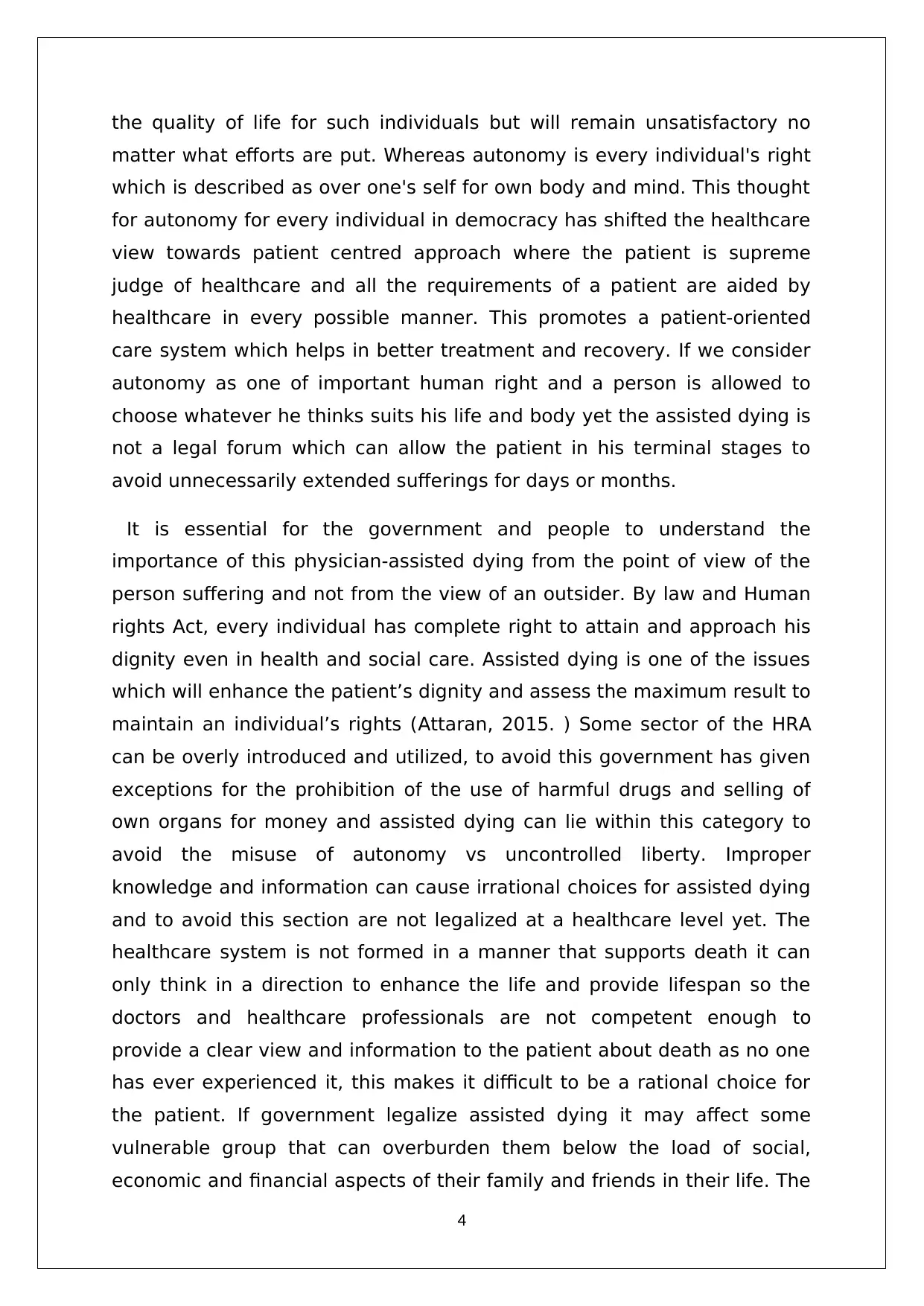
the quality of life for such individuals but will remain unsatisfactory no
matter what efforts are put. Whereas autonomy is every individual's right
which is described as over one's self for own body and mind. This thought
for autonomy for every individual in democracy has shifted the healthcare
view towards patient centred approach where the patient is supreme
judge of healthcare and all the requirements of a patient are aided by
healthcare in every possible manner. This promotes a patient-oriented
care system which helps in better treatment and recovery. If we consider
autonomy as one of important human right and a person is allowed to
choose whatever he thinks suits his life and body yet the assisted dying is
not a legal forum which can allow the patient in his terminal stages to
avoid unnecessarily extended sufferings for days or months.
It is essential for the government and people to understand the
importance of this physician-assisted dying from the point of view of the
person suffering and not from the view of an outsider. By law and Human
rights Act, every individual has complete right to attain and approach his
dignity even in health and social care. Assisted dying is one of the issues
which will enhance the patient’s dignity and assess the maximum result to
maintain an individual’s rights (Attaran, 2015. ) Some sector of the HRA
can be overly introduced and utilized, to avoid this government has given
exceptions for the prohibition of the use of harmful drugs and selling of
own organs for money and assisted dying can lie within this category to
avoid the misuse of autonomy vs uncontrolled liberty. Improper
knowledge and information can cause irrational choices for assisted dying
and to avoid this section are not legalized at a healthcare level yet. The
healthcare system is not formed in a manner that supports death it can
only think in a direction to enhance the life and provide lifespan so the
doctors and healthcare professionals are not competent enough to
provide a clear view and information to the patient about death as no one
has ever experienced it, this makes it difficult to be a rational choice for
the patient. If government legalize assisted dying it may affect some
vulnerable group that can overburden them below the load of social,
economic and financial aspects of their family and friends in their life. The
4
matter what efforts are put. Whereas autonomy is every individual's right
which is described as over one's self for own body and mind. This thought
for autonomy for every individual in democracy has shifted the healthcare
view towards patient centred approach where the patient is supreme
judge of healthcare and all the requirements of a patient are aided by
healthcare in every possible manner. This promotes a patient-oriented
care system which helps in better treatment and recovery. If we consider
autonomy as one of important human right and a person is allowed to
choose whatever he thinks suits his life and body yet the assisted dying is
not a legal forum which can allow the patient in his terminal stages to
avoid unnecessarily extended sufferings for days or months.
It is essential for the government and people to understand the
importance of this physician-assisted dying from the point of view of the
person suffering and not from the view of an outsider. By law and Human
rights Act, every individual has complete right to attain and approach his
dignity even in health and social care. Assisted dying is one of the issues
which will enhance the patient’s dignity and assess the maximum result to
maintain an individual’s rights (Attaran, 2015. ) Some sector of the HRA
can be overly introduced and utilized, to avoid this government has given
exceptions for the prohibition of the use of harmful drugs and selling of
own organs for money and assisted dying can lie within this category to
avoid the misuse of autonomy vs uncontrolled liberty. Improper
knowledge and information can cause irrational choices for assisted dying
and to avoid this section are not legalized at a healthcare level yet. The
healthcare system is not formed in a manner that supports death it can
only think in a direction to enhance the life and provide lifespan so the
doctors and healthcare professionals are not competent enough to
provide a clear view and information to the patient about death as no one
has ever experienced it, this makes it difficult to be a rational choice for
the patient. If government legalize assisted dying it may affect some
vulnerable group that can overburden them below the load of social,
economic and financial aspects of their family and friends in their life. The
4
Paraphrase This Document
Need a fresh take? Get an instant paraphrase of this document with our AI Paraphraser
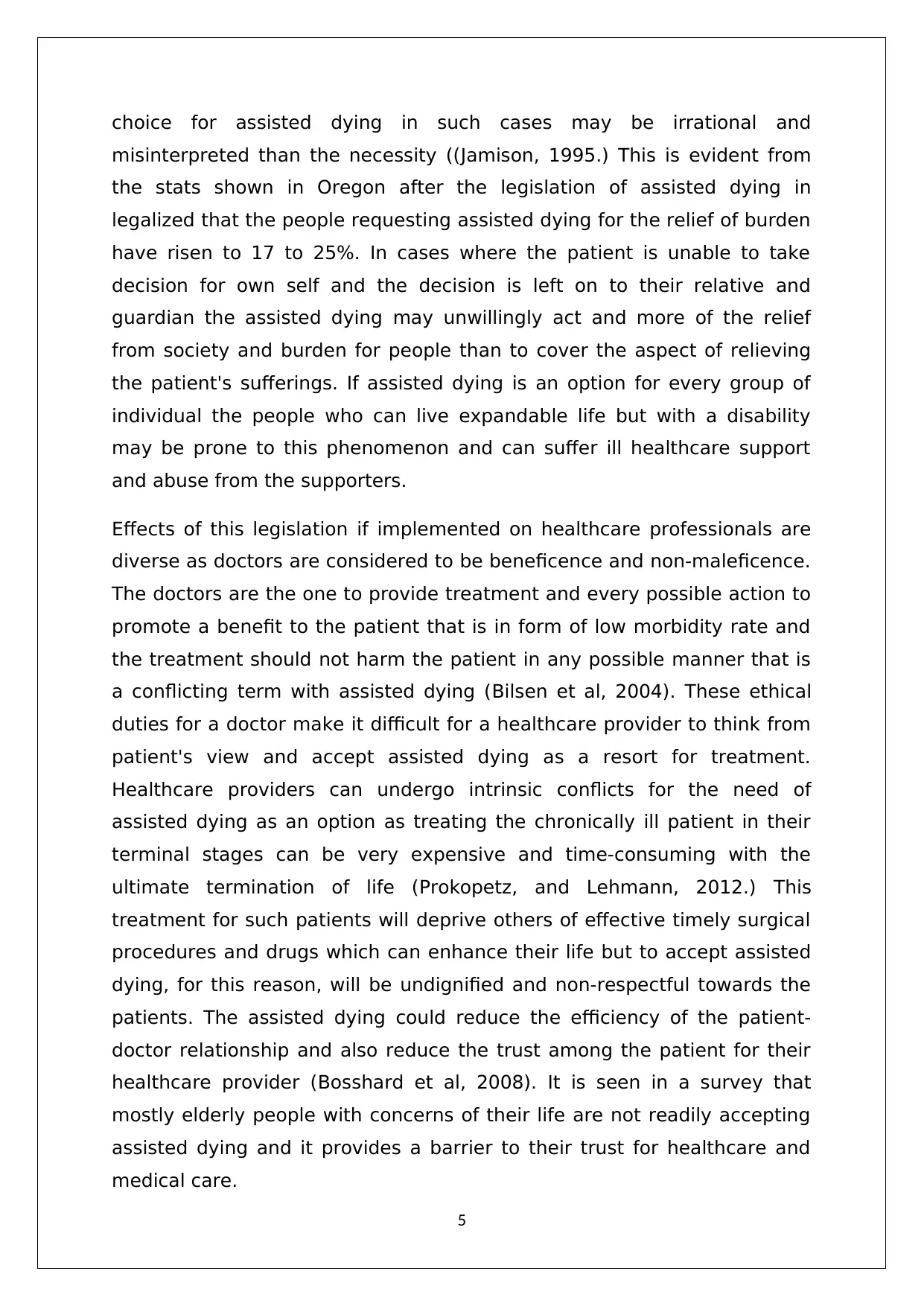
choice for assisted dying in such cases may be irrational and
misinterpreted than the necessity ((Jamison, 1995.) This is evident from
the stats shown in Oregon after the legislation of assisted dying in
legalized that the people requesting assisted dying for the relief of burden
have risen to 17 to 25%. In cases where the patient is unable to take
decision for own self and the decision is left on to their relative and
guardian the assisted dying may unwillingly act and more of the relief
from society and burden for people than to cover the aspect of relieving
the patient's sufferings. If assisted dying is an option for every group of
individual the people who can live expandable life but with a disability
may be prone to this phenomenon and can suffer ill healthcare support
and abuse from the supporters.
Effects of this legislation if implemented on healthcare professionals are
diverse as doctors are considered to be beneficence and non-maleficence.
The doctors are the one to provide treatment and every possible action to
promote a benefit to the patient that is in form of low morbidity rate and
the treatment should not harm the patient in any possible manner that is
a conflicting term with assisted dying (Bilsen et al, 2004). These ethical
duties for a doctor make it difficult for a healthcare provider to think from
patient's view and accept assisted dying as a resort for treatment.
Healthcare providers can undergo intrinsic conflicts for the need of
assisted dying as an option as treating the chronically ill patient in their
terminal stages can be very expensive and time-consuming with the
ultimate termination of life (Prokopetz, and Lehmann, 2012.) This
treatment for such patients will deprive others of effective timely surgical
procedures and drugs which can enhance their life but to accept assisted
dying, for this reason, will be undignified and non-respectful towards the
patients. The assisted dying could reduce the efficiency of the patient-
doctor relationship and also reduce the trust among the patient for their
healthcare provider (Bosshard et al, 2008). It is seen in a survey that
mostly elderly people with concerns of their life are not readily accepting
assisted dying and it provides a barrier to their trust for healthcare and
medical care.
5
misinterpreted than the necessity ((Jamison, 1995.) This is evident from
the stats shown in Oregon after the legislation of assisted dying in
legalized that the people requesting assisted dying for the relief of burden
have risen to 17 to 25%. In cases where the patient is unable to take
decision for own self and the decision is left on to their relative and
guardian the assisted dying may unwillingly act and more of the relief
from society and burden for people than to cover the aspect of relieving
the patient's sufferings. If assisted dying is an option for every group of
individual the people who can live expandable life but with a disability
may be prone to this phenomenon and can suffer ill healthcare support
and abuse from the supporters.
Effects of this legislation if implemented on healthcare professionals are
diverse as doctors are considered to be beneficence and non-maleficence.
The doctors are the one to provide treatment and every possible action to
promote a benefit to the patient that is in form of low morbidity rate and
the treatment should not harm the patient in any possible manner that is
a conflicting term with assisted dying (Bilsen et al, 2004). These ethical
duties for a doctor make it difficult for a healthcare provider to think from
patient's view and accept assisted dying as a resort for treatment.
Healthcare providers can undergo intrinsic conflicts for the need of
assisted dying as an option as treating the chronically ill patient in their
terminal stages can be very expensive and time-consuming with the
ultimate termination of life (Prokopetz, and Lehmann, 2012.) This
treatment for such patients will deprive others of effective timely surgical
procedures and drugs which can enhance their life but to accept assisted
dying, for this reason, will be undignified and non-respectful towards the
patients. The assisted dying could reduce the efficiency of the patient-
doctor relationship and also reduce the trust among the patient for their
healthcare provider (Bosshard et al, 2008). It is seen in a survey that
mostly elderly people with concerns of their life are not readily accepting
assisted dying and it provides a barrier to their trust for healthcare and
medical care.
5
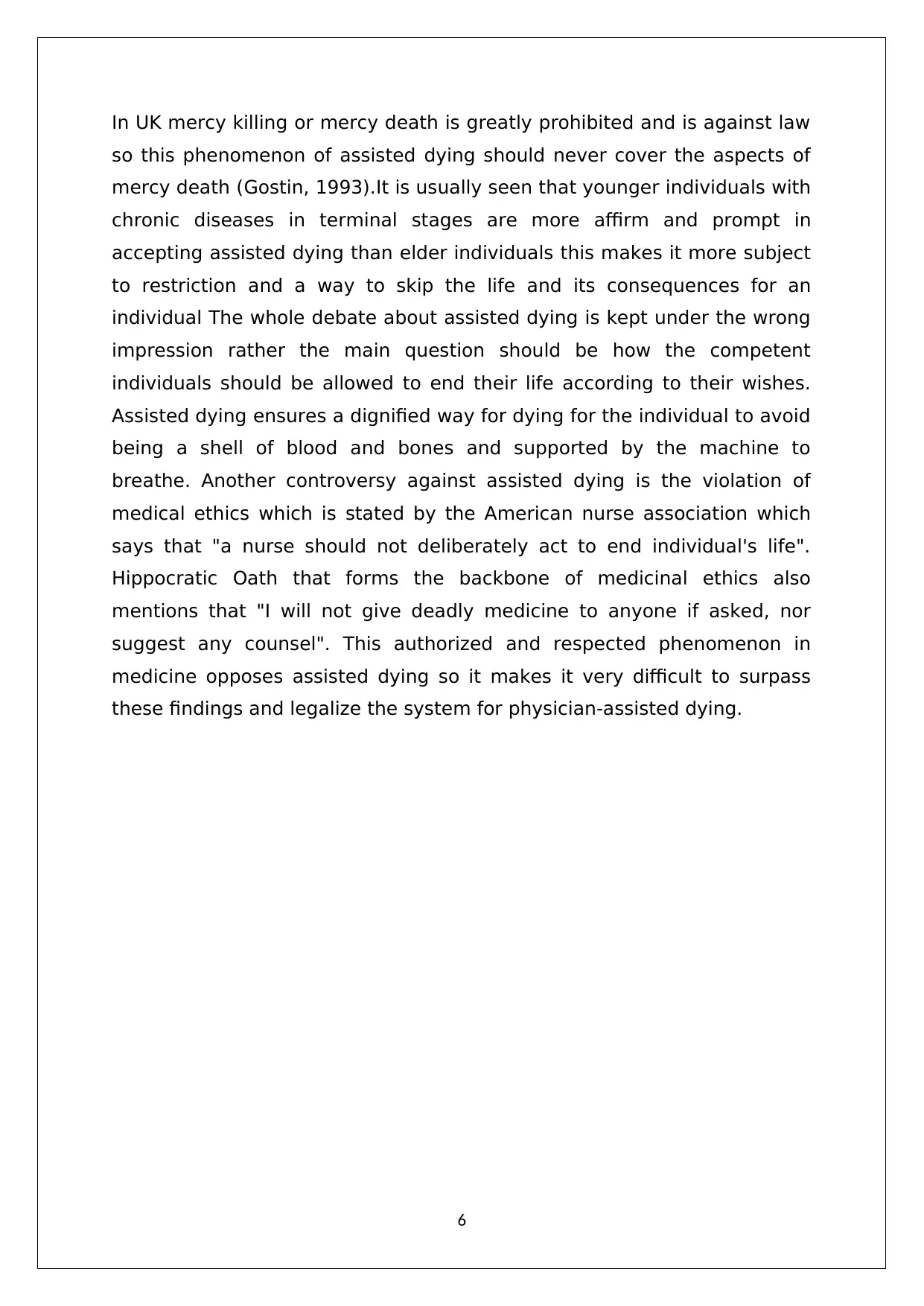
In UK mercy killing or mercy death is greatly prohibited and is against law
so this phenomenon of assisted dying should never cover the aspects of
mercy death (Gostin, 1993).It is usually seen that younger individuals with
chronic diseases in terminal stages are more affirm and prompt in
accepting assisted dying than elder individuals this makes it more subject
to restriction and a way to skip the life and its consequences for an
individual The whole debate about assisted dying is kept under the wrong
impression rather the main question should be how the competent
individuals should be allowed to end their life according to their wishes.
Assisted dying ensures a dignified way for dying for the individual to avoid
being a shell of blood and bones and supported by the machine to
breathe. Another controversy against assisted dying is the violation of
medical ethics which is stated by the American nurse association which
says that "a nurse should not deliberately act to end individual's life".
Hippocratic Oath that forms the backbone of medicinal ethics also
mentions that "I will not give deadly medicine to anyone if asked, nor
suggest any counsel". This authorized and respected phenomenon in
medicine opposes assisted dying so it makes it very difficult to surpass
these findings and legalize the system for physician-assisted dying.
6
so this phenomenon of assisted dying should never cover the aspects of
mercy death (Gostin, 1993).It is usually seen that younger individuals with
chronic diseases in terminal stages are more affirm and prompt in
accepting assisted dying than elder individuals this makes it more subject
to restriction and a way to skip the life and its consequences for an
individual The whole debate about assisted dying is kept under the wrong
impression rather the main question should be how the competent
individuals should be allowed to end their life according to their wishes.
Assisted dying ensures a dignified way for dying for the individual to avoid
being a shell of blood and bones and supported by the machine to
breathe. Another controversy against assisted dying is the violation of
medical ethics which is stated by the American nurse association which
says that "a nurse should not deliberately act to end individual's life".
Hippocratic Oath that forms the backbone of medicinal ethics also
mentions that "I will not give deadly medicine to anyone if asked, nor
suggest any counsel". This authorized and respected phenomenon in
medicine opposes assisted dying so it makes it very difficult to surpass
these findings and legalize the system for physician-assisted dying.
6
⊘ This is a preview!⊘
Do you want full access?
Subscribe today to unlock all pages.

Trusted by 1+ million students worldwide
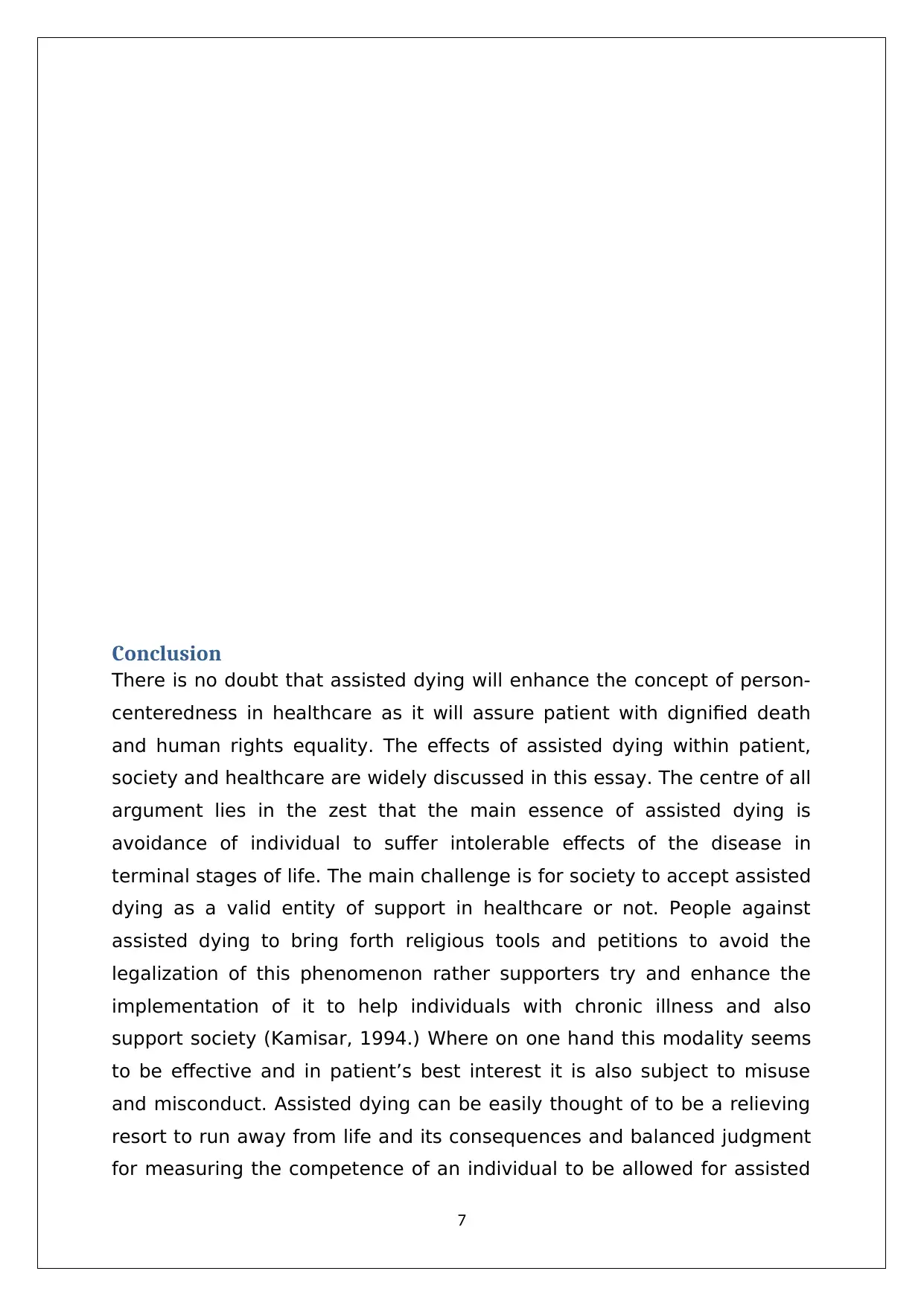
Conclusion
There is no doubt that assisted dying will enhance the concept of person-
centeredness in healthcare as it will assure patient with dignified death
and human rights equality. The effects of assisted dying within patient,
society and healthcare are widely discussed in this essay. The centre of all
argument lies in the zest that the main essence of assisted dying is
avoidance of individual to suffer intolerable effects of the disease in
terminal stages of life. The main challenge is for society to accept assisted
dying as a valid entity of support in healthcare or not. People against
assisted dying to bring forth religious tools and petitions to avoid the
legalization of this phenomenon rather supporters try and enhance the
implementation of it to help individuals with chronic illness and also
support society (Kamisar, 1994.) Where on one hand this modality seems
to be effective and in patient’s best interest it is also subject to misuse
and misconduct. Assisted dying can be easily thought of to be a relieving
resort to run away from life and its consequences and balanced judgment
for measuring the competence of an individual to be allowed for assisted
7
There is no doubt that assisted dying will enhance the concept of person-
centeredness in healthcare as it will assure patient with dignified death
and human rights equality. The effects of assisted dying within patient,
society and healthcare are widely discussed in this essay. The centre of all
argument lies in the zest that the main essence of assisted dying is
avoidance of individual to suffer intolerable effects of the disease in
terminal stages of life. The main challenge is for society to accept assisted
dying as a valid entity of support in healthcare or not. People against
assisted dying to bring forth religious tools and petitions to avoid the
legalization of this phenomenon rather supporters try and enhance the
implementation of it to help individuals with chronic illness and also
support society (Kamisar, 1994.) Where on one hand this modality seems
to be effective and in patient’s best interest it is also subject to misuse
and misconduct. Assisted dying can be easily thought of to be a relieving
resort to run away from life and its consequences and balanced judgment
for measuring the competence of an individual to be allowed for assisted
7
Paraphrase This Document
Need a fresh take? Get an instant paraphrase of this document with our AI Paraphraser

dying is always a matter of conflict. The power of an individual on his own
life will protect our civil liberty and assisted dying will help in achieving
this.
8
life will protect our civil liberty and assisted dying will help in achieving
this.
8

9
⊘ This is a preview!⊘
Do you want full access?
Subscribe today to unlock all pages.

Trusted by 1+ million students worldwide
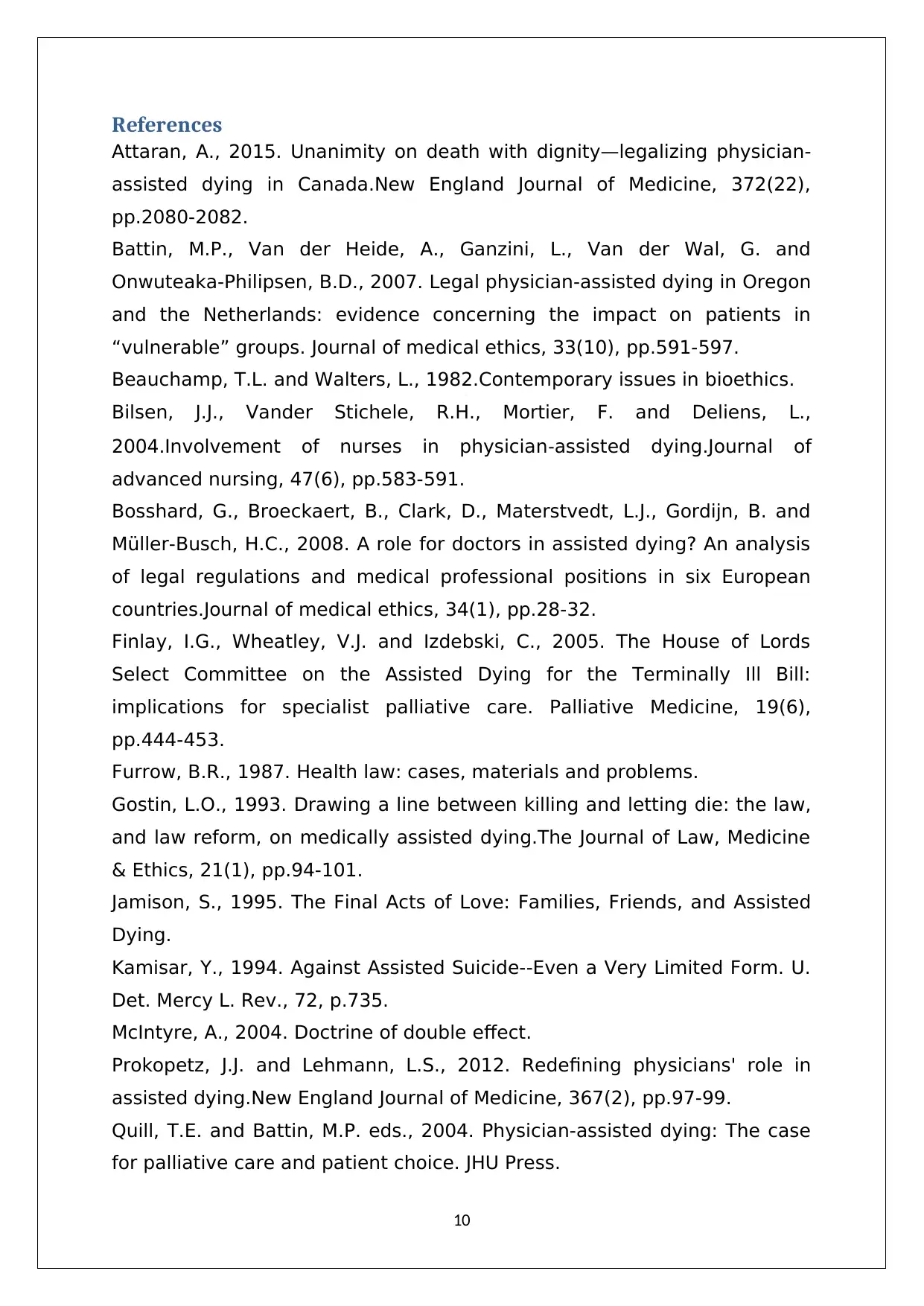
References
Attaran, A., 2015. Unanimity on death with dignity—legalizing physician-
assisted dying in Canada.New England Journal of Medicine, 372(22),
pp.2080-2082.
Battin, M.P., Van der Heide, A., Ganzini, L., Van der Wal, G. and
Onwuteaka-Philipsen, B.D., 2007. Legal physician-assisted dying in Oregon
and the Netherlands: evidence concerning the impact on patients in
“vulnerable” groups. Journal of medical ethics, 33(10), pp.591-597.
Beauchamp, T.L. and Walters, L., 1982.Contemporary issues in bioethics.
Bilsen, J.J., Vander Stichele, R.H., Mortier, F. and Deliens, L.,
2004.Involvement of nurses in physician‐assisted dying.Journal of
advanced nursing, 47(6), pp.583-591.
Bosshard, G., Broeckaert, B., Clark, D., Materstvedt, L.J., Gordijn, B. and
Müller-Busch, H.C., 2008. A role for doctors in assisted dying? An analysis
of legal regulations and medical professional positions in six European
countries.Journal of medical ethics, 34(1), pp.28-32.
Finlay, I.G., Wheatley, V.J. and Izdebski, C., 2005. The House of Lords
Select Committee on the Assisted Dying for the Terminally Ill Bill:
implications for specialist palliative care. Palliative Medicine, 19(6),
pp.444-453.
Furrow, B.R., 1987. Health law: cases, materials and problems.
Gostin, L.O., 1993. Drawing a line between killing and letting die: the law,
and law reform, on medically assisted dying.The Journal of Law, Medicine
& Ethics, 21(1), pp.94-101.
Jamison, S., 1995. The Final Acts of Love: Families, Friends, and Assisted
Dying.
Kamisar, Y., 1994. Against Assisted Suicide--Even a Very Limited Form. U.
Det. Mercy L. Rev., 72, p.735.
McIntyre, A., 2004. Doctrine of double effect.
Prokopetz, J.J. and Lehmann, L.S., 2012. Redefining physicians' role in
assisted dying.New England Journal of Medicine, 367(2), pp.97-99.
Quill, T.E. and Battin, M.P. eds., 2004. Physician-assisted dying: The case
for palliative care and patient choice. JHU Press.
10
Attaran, A., 2015. Unanimity on death with dignity—legalizing physician-
assisted dying in Canada.New England Journal of Medicine, 372(22),
pp.2080-2082.
Battin, M.P., Van der Heide, A., Ganzini, L., Van der Wal, G. and
Onwuteaka-Philipsen, B.D., 2007. Legal physician-assisted dying in Oregon
and the Netherlands: evidence concerning the impact on patients in
“vulnerable” groups. Journal of medical ethics, 33(10), pp.591-597.
Beauchamp, T.L. and Walters, L., 1982.Contemporary issues in bioethics.
Bilsen, J.J., Vander Stichele, R.H., Mortier, F. and Deliens, L.,
2004.Involvement of nurses in physician‐assisted dying.Journal of
advanced nursing, 47(6), pp.583-591.
Bosshard, G., Broeckaert, B., Clark, D., Materstvedt, L.J., Gordijn, B. and
Müller-Busch, H.C., 2008. A role for doctors in assisted dying? An analysis
of legal regulations and medical professional positions in six European
countries.Journal of medical ethics, 34(1), pp.28-32.
Finlay, I.G., Wheatley, V.J. and Izdebski, C., 2005. The House of Lords
Select Committee on the Assisted Dying for the Terminally Ill Bill:
implications for specialist palliative care. Palliative Medicine, 19(6),
pp.444-453.
Furrow, B.R., 1987. Health law: cases, materials and problems.
Gostin, L.O., 1993. Drawing a line between killing and letting die: the law,
and law reform, on medically assisted dying.The Journal of Law, Medicine
& Ethics, 21(1), pp.94-101.
Jamison, S., 1995. The Final Acts of Love: Families, Friends, and Assisted
Dying.
Kamisar, Y., 1994. Against Assisted Suicide--Even a Very Limited Form. U.
Det. Mercy L. Rev., 72, p.735.
McIntyre, A., 2004. Doctrine of double effect.
Prokopetz, J.J. and Lehmann, L.S., 2012. Redefining physicians' role in
assisted dying.New England Journal of Medicine, 367(2), pp.97-99.
Quill, T.E. and Battin, M.P. eds., 2004. Physician-assisted dying: The case
for palliative care and patient choice. JHU Press.
10
Paraphrase This Document
Need a fresh take? Get an instant paraphrase of this document with our AI Paraphraser
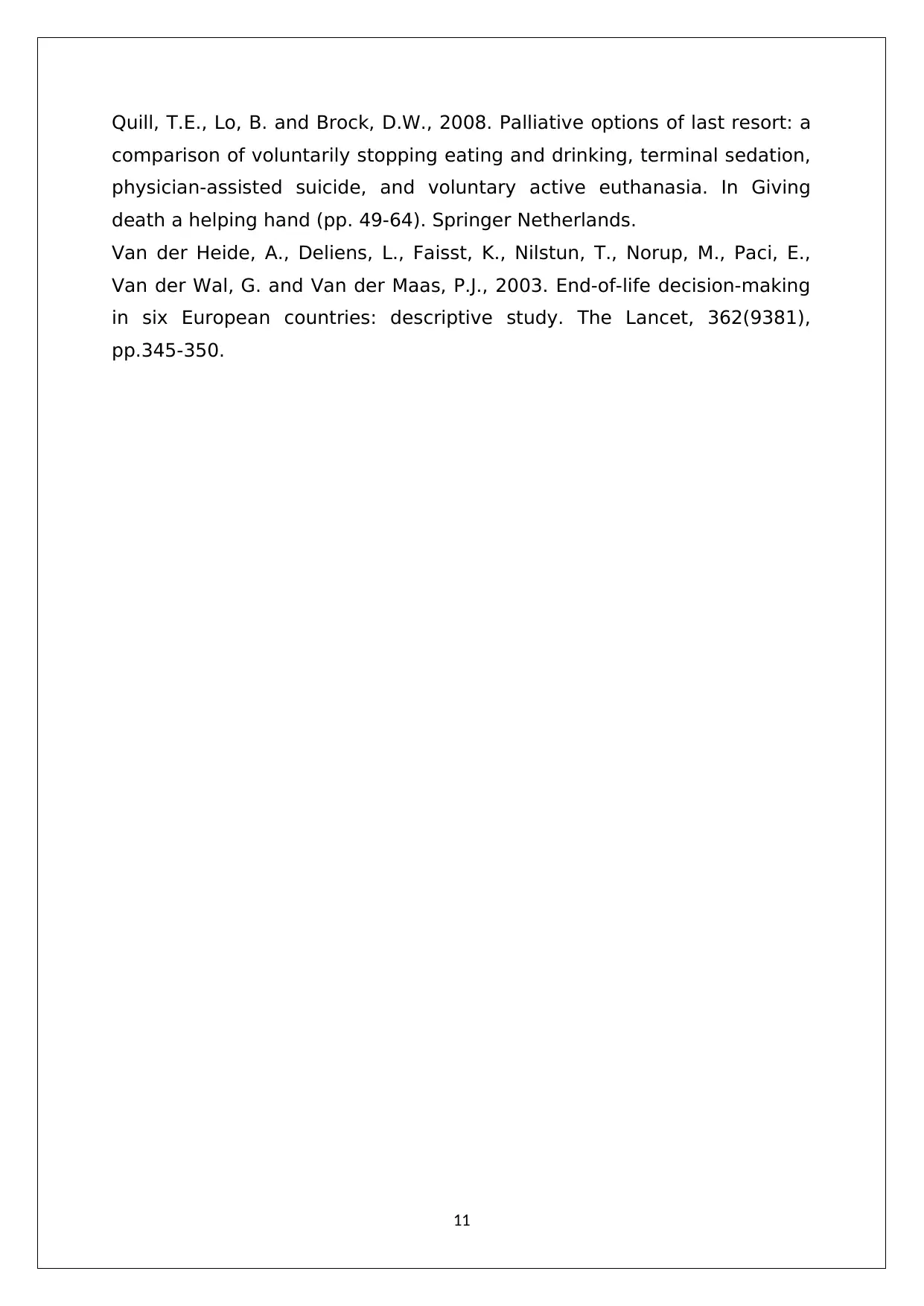
Quill, T.E., Lo, B. and Brock, D.W., 2008. Palliative options of last resort: a
comparison of voluntarily stopping eating and drinking, terminal sedation,
physician-assisted suicide, and voluntary active euthanasia. In Giving
death a helping hand (pp. 49-64). Springer Netherlands.
Van der Heide, A., Deliens, L., Faisst, K., Nilstun, T., Norup, M., Paci, E.,
Van der Wal, G. and Van der Maas, P.J., 2003. End-of-life decision-making
in six European countries: descriptive study. The Lancet, 362(9381),
pp.345-350.
11
comparison of voluntarily stopping eating and drinking, terminal sedation,
physician-assisted suicide, and voluntary active euthanasia. In Giving
death a helping hand (pp. 49-64). Springer Netherlands.
Van der Heide, A., Deliens, L., Faisst, K., Nilstun, T., Norup, M., Paci, E.,
Van der Wal, G. and Van der Maas, P.J., 2003. End-of-life decision-making
in six European countries: descriptive study. The Lancet, 362(9381),
pp.345-350.
11
1 out of 11
Related Documents
Your All-in-One AI-Powered Toolkit for Academic Success.
+13062052269
info@desklib.com
Available 24*7 on WhatsApp / Email
![[object Object]](/_next/static/media/star-bottom.7253800d.svg)
Unlock your academic potential
Copyright © 2020–2026 A2Z Services. All Rights Reserved. Developed and managed by ZUCOL.




